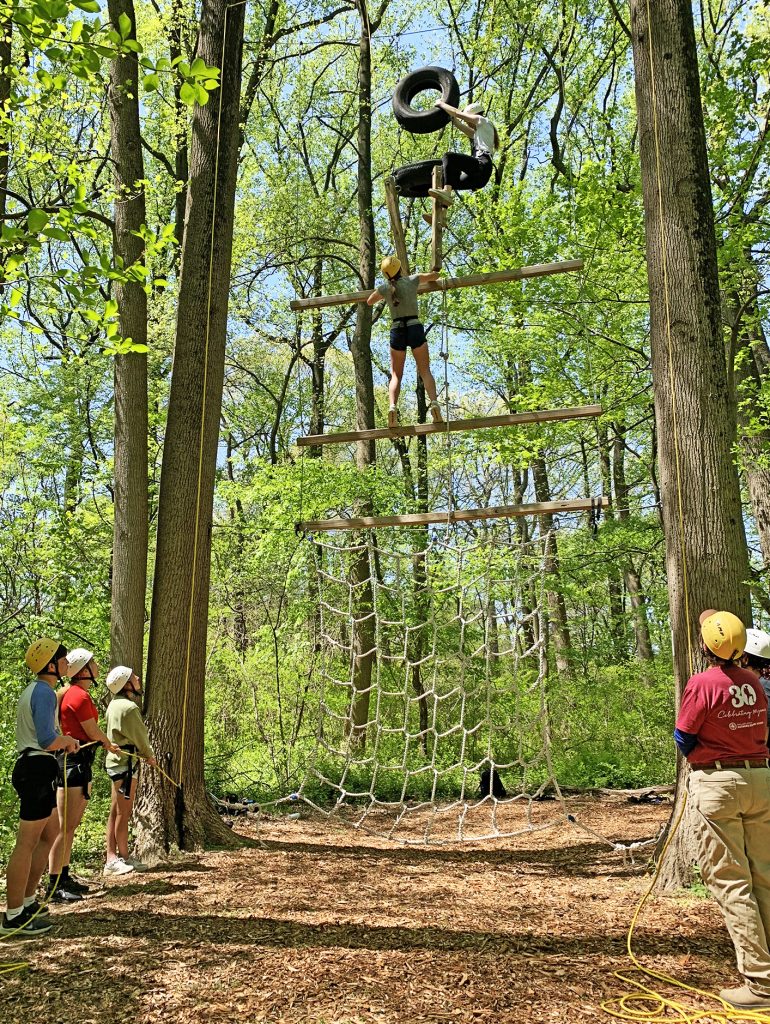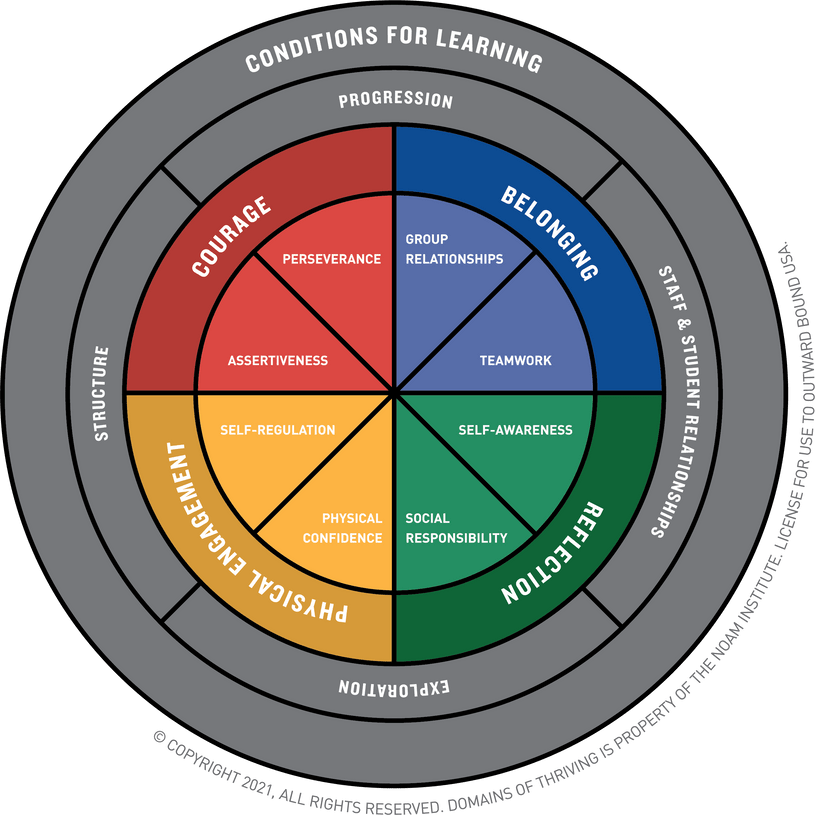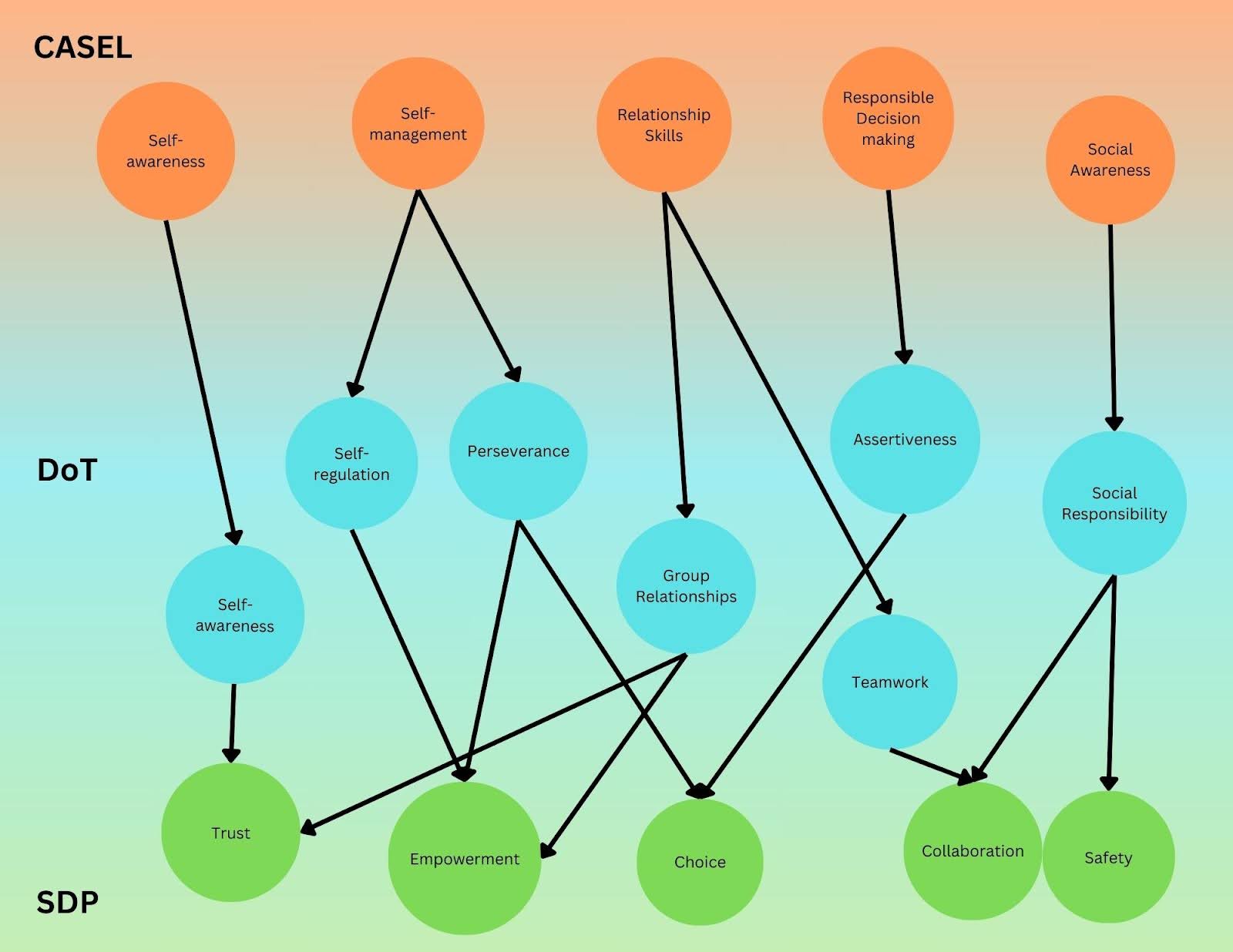The Transformative Power of Social Emotional Learning (SEL)
An overview of how SEL frameworks shape the experiential education programs of the Philadelphia Outward Bound School (POBS) and allow POBS to achieve positive outcomes with students of Philadelphia schools.
The Philadelphia Outward Bound School’s 30-year partnership with the School District of Philadelphia (SDP), and with charter, private, and parochial schools, focuses on teaching social-emotional skills outside the classroom to increase engagement and connection among peers and adults and positively impact classroom performance.
 Our educational approach emphasizes firsthand experiences of challenge, struggle, and achievement, fostering teamwork and addressing diverse social-emotional learning (SEL) needs. POBS students learn perseverance, form positive group relationships, and develop assertiveness – SEL skills that not only have a real world application, but are also focal points within Philadelphia classrooms. In essence, the SEL skills cultivated through POBS programs support the SDP’s work to improve school climate and culture and set up young people for future success.
Our educational approach emphasizes firsthand experiences of challenge, struggle, and achievement, fostering teamwork and addressing diverse social-emotional learning (SEL) needs. POBS students learn perseverance, form positive group relationships, and develop assertiveness – SEL skills that not only have a real world application, but are also focal points within Philadelphia classrooms. In essence, the SEL skills cultivated through POBS programs support the SDP’s work to improve school climate and culture and set up young people for future success.
What is Social Emotional Learning?
Social emotional learning (SEL) is the process through which all young people and adults develop and apply the knowledge, skills, and attitudes to understand their identities, manage their emotions, achieve individual and collective goals, understand and empathize for others, establish and maintain supportive relationships, and make responsible and caring decisions.
Hundreds of independent studies consistently demonstrate that SEL benefits students in academics, mental health, skills development, and school climate. The organization CASEL (Collaborative for Academic, Social, and Emotional Learning), a leader of the SEL movement since first introducing the term more than two decades ago, provides much of this research, as well as resources and guidance to educators and policymakers to promote the development of students’ SEL skills.
SEL promotes holistic development and fosters inclusive, supportive communities, aligning with the missions, values, and educational approaches of SDP and POBS. SDP’s strategic plan, Guardrail 1, prioritizes safe, welcoming schools with inclusive climates and access to social, emotional, and mental health supports. Research shows robust SEL skills enhance high school graduation, postsecondary enrollment, and stable employment prospects. 9th Grade Academy Initiatives and 9th Grade on Track for Graduation aid students in the middle school to high school transition and monitor their progress toward graduation.
Findings show that SEL programs reduce emotional distress, mitigate behavior issues, and promote prosocial skills, fostering a sense of belonging and improving attitudes toward school and peers. The SDP’s Relationships First Framework and 9th-grade programs prioritize relationship-building as crucial for future success.
The Student Health and Well-Being Survey results from 2023-2024 show the impact of these initiatives. Across the District, students in grade 9 reported positive relationships with their peers at a higher rate than students in other grades. 82.7% of students agree or strongly agree that they have a positive relationship with at least one adult at school. 87.5% of students agree or strongly agree that they have close friends at school.
 POBS emphasizes connection before content between students and educators to scaffold learning that enhances empathy and resilience. The former Deputy Chief of the Office of Climate and Culture at the SDP stated, “Outward Bound is a great example of a program that’s fun and engaging and really actively targets students’ social emotional learning. When you do OB activities, you learn teamwork, communication, flexibility, and resilience, and you learn to raise your own expectations for yourself. Those are the skills we know that are highly predictive of successful lifelong outcomes.”
POBS emphasizes connection before content between students and educators to scaffold learning that enhances empathy and resilience. The former Deputy Chief of the Office of Climate and Culture at the SDP stated, “Outward Bound is a great example of a program that’s fun and engaging and really actively targets students’ social emotional learning. When you do OB activities, you learn teamwork, communication, flexibility, and resilience, and you learn to raise your own expectations for yourself. Those are the skills we know that are highly predictive of successful lifelong outcomes.”
Importantly, SEL isn’t solely reserved for students; it’s equally beneficial for educators. Those with strong SEL skills not only experience less burnout but also foster deeper connections with their students and feel more equipped to navigate classroom dynamics. This, in turn, cultivates a healthier and more supportive educational environment. As educator Joel Jaroch from Overbrook Educational Center attests, “Applying the lessons from my Outward Bound course to the classroom has undoubtedly enhanced my teaching abilities.”
SEL Frameworks
Many SEL frameworks exist as structured approaches to promoting the development of essential social and emotional skills in individuals. There are three SEL frameworks that are useful for our purposes.
CASEL’s Framework
CASEL’s framework is one of the most widely recognized utilized frameworks. Known as the “CASEL Wheel”, it focuses on five broad, interrelated areas of competence.

Domains of Thriving
Outward Bound, in conjunction with the Partnerships for Education and Resilience (PEAR) institute, developed the Domains of Thriving framework and tool that defines the key SEL areas in an OB experience.

Relationships First
Relationships First is a restorative justice approach utilized by the School District of Philadelphia. It prioritizes relationships and creating a culture of accountability and healing to emphasize repairing harm, restoring relationships, and promoting positive behavior rather than punitive measures.

All three of these frameworks have similar language and concepts that overlap and complement each other. The diagram below illustrates how the three SEL frameworks correlate.

The table below defines the rubrics within the three SEL frameworks and shows how they relate to each other:

Conclusion
The partnership between POBS and the SDP stands as a testament to the transformative power of SEL beyond the confines of traditional classroom settings. By instilling perseverance, fostering teamwork, and cultivating assertiveness among students, POBS programs not only align with the SDP’s commitment to creating safe and inclusive learning environments but also equip young people with the essential skills needed for future success. Moreover, the emphasis on SEL extends beyond students to educators, who benefit from strengthened relationships with students, reduced burnout, and enhanced classroom management skills.
SEL research, as well as data from the SDP and our own OBOS Surveys, shows that a holistic approach to education prioritizing the social and emotional well-being of all stakeholders ultimately paves the way for a more resilient and supportive educational community.
